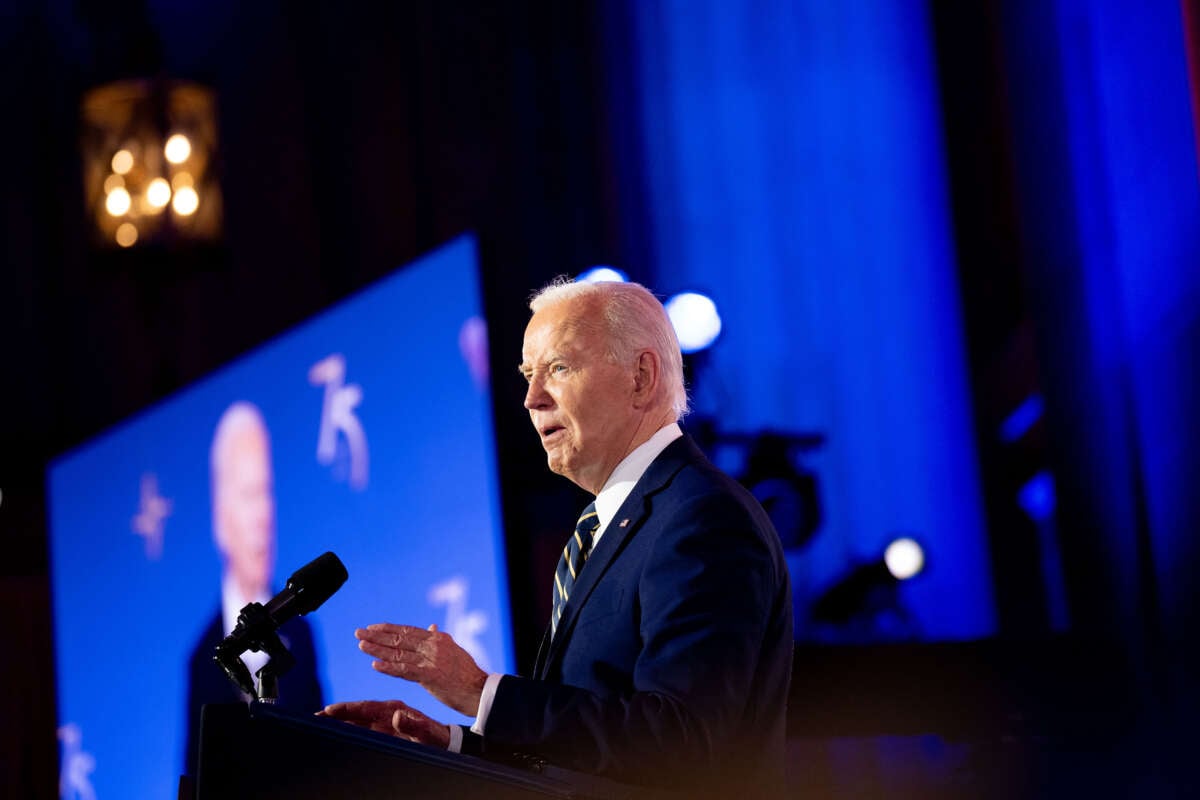President Joe Biden, the Democratic nominee for president in 2024, argued earlier this week that calls for him to step down from the ticket and allow someone else to run as the Democratic candidate are improper, vaguely citing “democracy.”
Calls for Biden’s departure from the top of the ticket intensified after his poor debate performance against GOP presumptive nominee Donald Trump in late June. During that debate, Biden often failed to answer questions coherently, prompting some members of his party and progressive political voices to suggest that he should voluntarily step aside.
Biden has repeatedly justified staying in the race by noting that he won the Democratic primaries, and thus, replacing him as the nominee would violate the tenets of democracy that the Democratic party is attempting to promote in their campaign against Trump.
In a letter to Congress this past week, Biden sought to quell calls for him to drop out from the race, stating, “the voters — and the voters alone — decide the nominee of the Democratic Party.”
“How can we stand for democracy in our nation if we ignore it in our own party?” Biden added.
In an interview on MSNBC’s “Morning Joe” program, Biden claimed that it was “elites” who were trying to replace him as a candidate, despite the fact that he himself has been a Democratic Party elite for several decades.
Biden’s arguments for staying in the race don’t stand up to scrutiny — notably, Biden ran virtually unopposed in the primaries, without a viable Democratic Party challenger. Indeed, months before the start of the caucus and primary election season, Democratic leaders urged potential challengers to refrain from entering the intraparty presidential nominating contest against him.
As a result, Biden won almost every primary election that was held over the past year, with “uncommitted” coming in second place.
Beyond not facing any real competition, significantly fewer voters participated in the Democratic primaries this year than in 2020. In that year, more than 19 million voters selected Biden out of a slew of other Democratic Party contenders. Nearly 37 million voters took part in those primaries altogether.
But in 2024, that number was more than halved, with only 16.6 million voters taking part in the primaries, likely due to the lack of options. Even though Biden ran virtually unopposed, he saw his total number of votes shrink down to around 14.5 million voters.
Notably, two states — Florida and Biden’s home state of Delaware — didn’t hold primaries at all, with both rewarding all of their delegates to the incumbent president as a result.
The legitimacy of Biden’s claims about “democracy” is even more questionable when considering polling data over the past year.
A Quinnipiac University survey in November, for example, found that more than half of American voters wanted options in the presidential race besides Trump and Biden. Among Democratic-leaning voters, around 6 in 10 said they wanted options besides Biden.
In a CBS News/YouGov poll conducted shortly after the debate, nearly three-quarters of voters, 72 percent, said they didn’t want Biden to run for president again — up from 63 percent who had said the same thing in February, indicating that nearly 1 in 10 voters moved away from Biden after the debate had aired.
Biden has repeatedly rejected calls for him to step aside and allow another candidate to run — and barring any more gaffes from him this week and into the rest of the month, it’s likely that he will remain in the race.
However, that doesn’t mean that Biden doesn’t have to play “catch up” to deal with the aftermath of his debate performance. Although Biden and Trump were nearly tied before the debate, an aggregate of polling data from FiveThirtyEight examining various swing states in this year’s race shows that Biden has ceded significant ground to Trump since the end of June.
In Wisconsin, for example, Biden was leading Trump by 0.3 points in the average of polls conducted prior to the debate. As of Monday afternoon, however, Trump led Biden by an average of 1.5 points, indicating a 1.8-point shift in Trump’s favor following the debate.
The same kind of shift in polls held true in Nevada, another swing state, where Trump increased his lead by 1.9 points. And in Pennsylvania, Trump, who had led Biden by just 0.8 points before the debate, led him by 3.3 points as of Monday afternoon, on average.
Speaking against the authoritarian crackdown
In the midst of a nationwide attack on civil liberties, Truthout urgently needs your help.
Journalism is a critical tool in the fight against Trump and his extremist agenda. The right wing knows this — that’s why they’ve taken over many legacy media publications.
But we won’t let truth be replaced by propaganda. As the Trump administration works to silence dissent, please support nonprofit independent journalism. Truthout is almost entirely funded by individual giving, so a one-time or monthly donation goes a long way. Click below to sustain our work.
